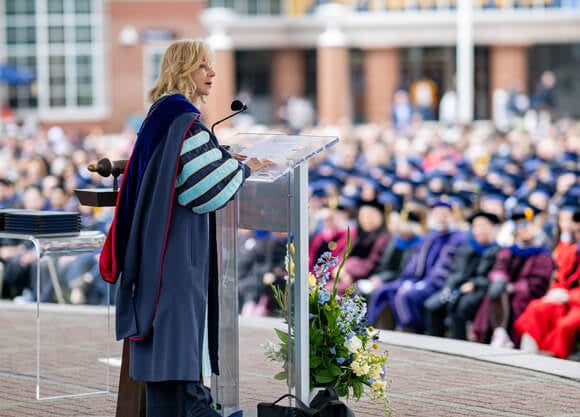
Being an effective president: Olian discusses transformational deanships and broadening experiences with 'Deans Counsel' podcast
August 01, 2024

August 01, 2024

Before joining Quinnipiac in 2018, Olian held two high-profile deanships at UCLA Anderson School of Management and the Smeal College of Business Administration at Pennsylvania State University, remarkably transforming both institutions. Prior, Olian was a professor and senior associate dean at the Robert H. Smith School of Business at the University of Maryland.
In a recent conversation with the “Deans Counsel” podcast, Olian discussed how these deanships, along with other broadening experiences that she began pursuing early in her career, fundamentally prepared her to be an effective president.
The 40-minute in-depth podcast provides Olian’s interesting insights on the advantages and potential weaknesses business school deans may have when it comes to progressing to higher levels of responsibility in the university. Olian also shares tips based on her successful approaches to efficiently and effectively drive change and the importance of identifying key talent to build a strong team to implement change.
Olian said pursuing a breadth of vision of higher education was a critical factor in developing her leadership skills. Early in her career, Olian began volunteering outside of her regular duties, moving up through volunteer roles and eventually joining corporate and nonprofit boards. Prior to joining UCLA, she served as chair of the Association to Advance Collegiate Schools of Business (AACSB), the premier thought leadership and accreditation organization for leading global business schools.
“That gives you a view of so many alternative models of universities. That was really helpful and it came about because of a volunteer role,” said Olian.
Under her leadership, UCLA Anderson hired a record number of faculty, expanded its prestigious Board of Visitors and raised more than $450 million for student and faculty support, innovative programming and capital improvements.
Olian said involvement in university organizations, such as UCLA’s council of professional deans, broadened her knowledge of other professional schools at the university. Olian went on to chair the council, additionally serving on the president’s executive cabinet.
“I got to see and hear a lot about the other parts of the university and the other professional schools,” Olian said. “When you become a president, you become a president of all the schools and not just your own school. It’s important to be able to see the whole and to see the intersections of the whole. That was very helpful in preparing me for the nuances of decisions and issues that are priorities in the different schools.”
One of the messages Olian provides to aspiring academic leaders is to view their career not as a pyramid with a narrow focus, but as an inverted pyramid.
“Broaden your focus. Have a vision across functions, across disciplines, across schools and of some of the complexities of the administrative roles that go into running a university,” said Olian.
Among strengths, Olian feels business school deans may have as preparatory to presidency is experience in dealing with powerful boards.
“The board I had at UCLA Anderson and before that, at Penn State, was a powerhouse board,” said Olian. “Because we were a public institution, they were an advisory board, but they treated themselves and I treated them as if it was a fiduciary board. You have to be comfortable dealing with a board that hires and fires you as the president and know how to deal with those relationships and leverage the power of the board in terms of advisory, guidance, networking and yes, philanthropy. I think as a business school dean, if you can derive experience in that, you’ll be way ahead of the curve.”
Olian said that experience should also extend to knowing how to talk to the board.
“I can tell you that the board tells me they appreciate that I have an executive business mentality in talking to the board. That is a huge asset that business schools bring to a presidency.”
Olian said universities are seeking presidents with breadth, strategic vision and an understanding of the totality of the university.
“They’re looking for the fact that you have gone into their culture, into the guts of who they are and that you understand and respect that and can bring something to that while building on what they have,” Olian said.
When Olian joined Quinnipiac, she succeeded a president who had served for 31 years
“Change takes quite a while because systems are built around certain traditions, customs and policies,” said Olian. “It means you have to change all the levels and the ways people operate to achieve change. But I think that once you galvanize people around a shared purpose and around a shared strategy, it is actually very gratifying to see how that occurs.”
Olian surrounded herself with a strong provost and other dynamic university leaders.
“The higher up you are in an organization, the more delegation that has to occur, and therefore, the reliance on the capabilities of people who are around you is greater,” said Olian. “The key responsibility is to get the right people on the bus — a fantastic team who then execute around a shared purpose. My responsibility is to create shared understanding — that we all know where the bus is headed — and then everyone fans out and does their own thing.”
Olian said one important nuance of successfully developing a new team involves a mix of strategy and recognizing interpersonal disposition.
“You want to see how the person fits with the gestalt of your strategy and our strategy is very nimble, very forward-looking, very change-oriented,” said Olian. “You want to see if somebody embraces that kind of change, that kind of nimbleness and openness to change.”
Quinnipiac Today is your source for what's happening throughout #BobcatNation. Sign up for our weekly email newsletter to be among the first to know about news, events and members of our Bobcat family who are making a positive difference in our world.
Sign Up Now